Final Report for FNE16-851
Project Information
The Kingston YMCA Farm Project is a beloved and highly visible new fixture within a treasured neighborhood institution. In addition to a large garden plot located on the grounds of the Y, an on-site farm stand and a bike-powered mobile market, the Kingston YMCA Farm Project engages youth through a low-cost summer camp in which kids grow and harvest food with an urban farmer and prepare meals together with assistance from Chef’s Consortium.
Rave reviews from campers and their families and Y customers suggested unmet demand for more fresh, local produce. The Kingston YMCA Farm Project wanted to provide campers enough raw ingredients to recreate meals at home with their families, and provide more produce options at their various outlets. Good Flavor Farm, in its 5th year of certified naturally grown vegetable production, was interested in meeting that demand.
The 6 items of produce we decided to include were: Green Beans, Kale, Carrots, Beets, Cucumber and Zucchini. After selecting the crops we collaborated with members of the Chefs Consortium in order to select 6 recipes showcasing those crops for use in the expanded summer camp program and made translations into Spanish. Though only 2 families participated in the take-home option for all 6 weeks, when surveyed, both agreed that their children enjoyed eating vegetables more after participating in our project and were now more likely to help with meal participation.
Together we hoped a modest initial investment in building a relationship between the Kingston YMCA Farm Project and Good Flavor Farm would create a more food-secure urban center while yielding a reliable source of income for a small-scale farm. After the conclusion of our grant project we found that Kingston YMCA Farm Project sales increased by 5% from 2015 to 2016, while related sales for Good Flavor Farm yielded less than $2,300.
Introduction:
Facing plummeting sales at local Farmers Markets and a saturation of the traditional CSA market in New York's Hudson Valley, I was interested in developing a new arena for my certified naturally grown produce and expanding my farm's commitment to outreach and education.
Collaboration with a nearby urban agricultural program seemed like a logical pathway for achieving this goal. The Kingston YMCA Farm Project engages young participants in a low-cost summer camp involving growing and harvesting food on a 1/4 acre garden plot located on the grounds of the YMCA in Kingston, NY with an urban farmer and preparing meals with the assistance of area chefs through the Chefs Consortium.
Feedback from campers and their families demonstrated tremendous enthusiasm for the project, and an increased demand for the raw ingredients. The nearest full-size supermarket is over a mile from the YMCA, which is located in the heart of Mid-town Kingston. Furthermore, although the wealthier uptown section of Kingston enjoys a weekly Farmers Market, the Midtown Farmers Market is no longer in operation. With two farm stands, a bike powered mobile market and a stationary stand in the lobby of the YMCA, in addition to the families of summer camp participants, collaboration with the Kingston YMCA Farm Project offered several potential outlets for locally grown, sustainably produced vegetables. However, given the land and financial constraints typical of small Northeastern cities there seemed to be little opportunity to expand the current garden space.
>Not only would a partnership between an urban agricultural project and a larger nearby farm improve the health and well-being of an under-served population in a low-income neighborhood, it suggested the potential to help support and sustain the mission of the farm by advancing its financial and environmental goals while addressing some obvious inequities in our society. Small-scale farmers desperately need to expand the current customer base, beyond those who have the purchasing power to shop at high-end groceries and upscale Farmers Markets, and respond to the untapped demand for affordable, real food that's culturally enticing and grown close to home.
This grant project endeavored to meet demand for affordable, real food by building a partnership between an urban agricultural project and a small-scale rural farm in two ways: offering a greater quantity or variety of produce at the various Kingston YMCA Farm Project outlets, and augmenting the Y summer camp program with a take-home component that included raw ingredients and a user-friendly recipe card.
Project partners agreed on three vital criteria: we needed to make sure we're expanding options for the existing customer base without competing with each other, that we're creating enticing options that increase the overall consumption of produce and that we're sharing our findings with a considerable number of other urban agricultural project leaders as well as more small-scale farmers in more rural locations.
To avoid competition between the Kingston YMCA Farm Project and Good Flavor Farm we wanted to look critically at our individual productions and evaluate which specific crops were the most successful to grow, while meeting nutritional needs and retaining popularity with campers and the customers who frequent the Kingston YMCA Farm Project Market (Y Market). Once we identified which crops could be grown, we wanted to collaborate with members of the Chefs Consortium in order to develop 6 recipes showcasing those crops for use in the expanded summer camp program.
To create enticing options we wanted to ensure that our recipe cards and supporting outreach materials would be user-friendly, so we planned to work with a translation specialist and a graphic designer to help us achieve this goal, we also met with the Camp Director, who expressed great enthusiasm for the project and pledged his assistance in helping to advance our goals.
Throughout the season we aimed to document our progress with photographs, log-keeping and careful note-taking in order to fulfill the grant obligations as well as sharing our findings with other targeted audiences.
Cooperators
Research
In order to foster a symbiotic relationship between a small-scale, certified naturally grown farm and a nearby community-based youth gardening project, a thorough understanding of the strengths and challenges that exist for both partners is necessary. We looked critically at our production and evaluated what crops are the most successful to grow and why, as well as the most nutritious while retaining popularity with campers and the customers who frequent the Kingston YMCA Farm Project markets/stands. Consideration was also given to those crops that are the most cost effective to grow, without sacrificing the values mentioned above. From these findings we developed a common list of vegetables that Good Flavor Farm could grow to augment and expand the current produce available at the Kingston YMCA Farm Project markets/stands. Crop planning reflected the time frame of the 6 week summer program, and the season for the YMCA markets/stands.
Because the success of the cooking instruction is due in part to the guidance, enthusiasm and expertise from members of the Chefs Consortium, communication took place between both project partners and representatives of Chefs Consortium in order to develop a list of 6 recipes that can be used for the 6 week summer camp program. Each of the 6 recipes draw heavily or exclusively from the list of vegetables that the project partners agreed upon. We worked with a translation specialist to translate the recipes and other outreach materials from English to Spanish.
We also worked with a graphic designer, recommended by the project adviser, to develop, design and produce laminated double-sided English/Spanish recipe cards for use during the 6 week camp session. We contracted for the manufacture of cloth grocery bags for campers to bring home their produce, and purchased disposable paper bags, and plastic bags with handles for campers who neglect to bring their cloth bag on cooking instruction days. Both the recipe cards and the cloth bags featured the names of the Kingston YMCA Farm Project, Good Flavor Farm and Chefs Consortium, in order to reinforce the relationship between the project partners within the community. As the market season and summer camp session approached we stayed in close contact regarding the performance of plants in the fields, and either confirm anticipated yields or identify the need for necessary changes.
Throughout the growing season we incorporated various measurements into our programming to demonstrate and test the value of building a relationship between the project partners. One useful source for establishing measurements stemmed from the work of our technical adviser through her efforts on the Poughkeepsie City School District Hudson Valley Farm to School Project – A Whole Systems Approach to Local Food Procurement & Community Engagement. Her project included a Fresh Vegetable Pre and Post Test, which demonstrated an increase in kids' familiarity with basic cooking skills and the value of using local produce after project implementation.
For the purposes of our project we adapted our own Fresh Vegetable Entrance and Exit Surveys to demonstrate whether being able to bring fresh, local ingredients and a corresponding recipe home from camp actually encourages campers and their families to procure and prepare more fresh, local produce in their homes together. In addition to measuring the success of the camp programming with its new take-home produce component, we wanted to see if a greater quantity and diversity of produce varieties at the Kingston YMCA Farm Project markets/stands would increase total sales.
Good Flavor Farm kept a log of all varieties, amounts and retail value of produce sold at the Kingston YMCA Farm Project markets/stands during the 2016 growing season. Good Flavor Farm produce was marketed by me at a separate table at market, or kept in separate produce totes marked with a zip-tie to distinguish it from the produce grown on-site at the Y.
At the end of the 2016 growing season we compared 2014, 2015 and 2016 Kingston YMCA Farm Project sales in light of the Good Flavor Farm log in order to determine if the greater quantity and diversity of produce varieties at the Kingston YMCA Farm Project markets/stands was financially beneficial to both project partners.
I was able to include the scope of our project and our findings as a panelist on Selling to Institutions at the national Young Farmer Conference hosted by Stone Barns Center for Food and Agriculture in New York State.
We looked critically at our individual productions and evaluated which specific crops were the most successful to grow, while meeting nutritional needs and retaining popularity with campers and the customers who frequent the Kingston YMCA Farm Project Market (Y Market).
The 6 items of produce we decided to include were: Green Beans, Kale, Carrots, Beets, Cucumber and Zucchini. After selecting the crops we collaborated with members of the Chefs Consortium in order to select 6 recipes showcasing those crops for use in the expanded summer camp program.
I worked with KayCee to develop outreach materials describing the take-home option and we worked with our technical adviser to create a meaningful entrance and exit survey for the parents and family members of the participants in Camp Starfish. After developing materials in English I worked with a translation specialist to translate those documents into Spanish.
warm-green-beans-and-turnips kale-salad glazed-carrots fried-zucchini cucumber-salad beet-and-carrot-salad
Then, I worked closely with a graphic designer to transform our written recipes into attractive, laminated, double-sided English/Spanish cards as well as creating brightly colored produce bags for campers and their families who participated in the take-home option.
KayCee introduced me to the director of Camp Starfish who expressed enthusiasm for the expanded program. I set up a table near the camp registration and gave out samples of produce and recipe cards to promote registration for the take-home produce. Only 12 family members out of 75 camp participants elected to fill out the entrance survey. 10 out of 12 surveyed have children in their household who enjoy eating vegetables, and all households surveyed have children who participate in the preparation of meals at home. 2 families surveyed were unaware that there was an urban farm located on the grounds of the Kingston YMCA, and 4 families surveyed did not realize there was a farm stand inside the lobby. All the participants in the survey agreed that the specific farm stand hours were convenient, and that the Kingston YMCA is generally a convenient location to pick-up fresh produce.
Unfortunately, only 2 families participated in the take-home option for all 6 weeks. However, when surveyed both agreed that their children enjoyed eating vegetables more after participating in our project and were now more likely to help with meal participation.
Meanwhile I participated as a weekly vendor in the Y Market selling the agreed upon items I grew at Good Flavor Farm, wholesaled produce for other Kingston YMCA Farm Project outlets and helped to support the grow-harvest-cook sessions of Camp Starfish.
The following document offers a log of sales, which include all the produce grown by Good Flavor Farm for the grant project. good-flavor-farm-and-ymca
At the conclusion of the season I spoke on a panel with two other food activists entitled Selling to Institutions at the Young Farmers Conference hosted by the Stone Barns Center for Food and Agriculture. The panel was well attended and the dialogue was recorded and will be available at a future date through Stone Barns.
In general the YMCA as an institution, does seem like a great fit for fresh, locally grown, low-input produce because nearly all of the members are concerned with improving their health and well-being. And, our careful identification of desired crop varieties successfully prevented overlap at the Y Market. So, although the market wasn't very lucrative for Good Flavor Farm, fortunately the joint effort this season did not seem to depress sales for the Kingston YMCA Farm Project.
Customers who attended the Y Market seemed pleased with the new availability of certain summer favorites, such as cantaloupe and watermelon and larger quantities of staples, such as broccoli and carrots. And, the 2 families who participated in the expanded take-home program were very pleased with the quality of the produce, the durable quality of the recipe cards, and importantly the kid-friendly appeal of the recipes themselves.
The following photos demonstrate grant partner KayCee Wimbish's grow-harvest-cook program at the Kingston YMCA and cooking instruction from Nicci Cagan representing the Chef's Consortium.
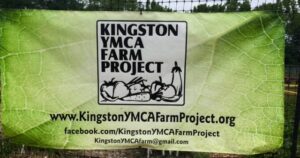
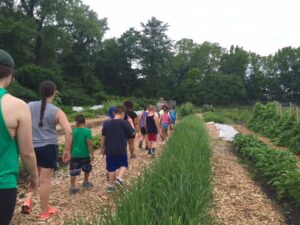
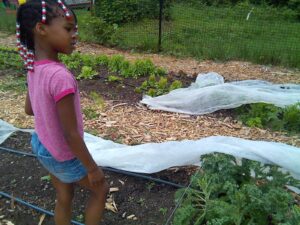
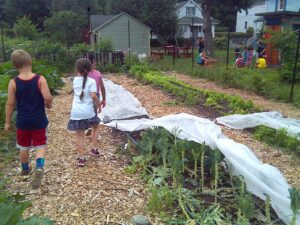
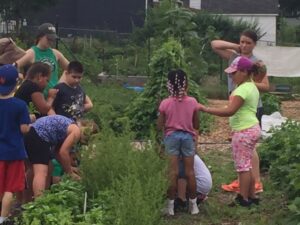
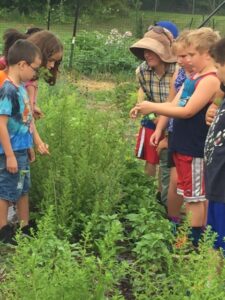
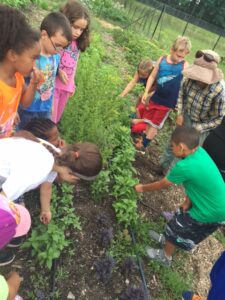
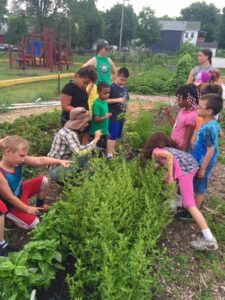
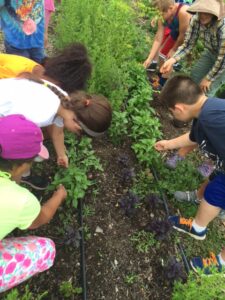
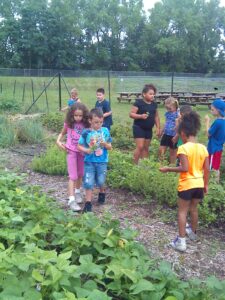
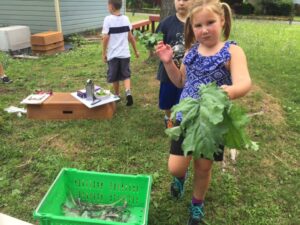
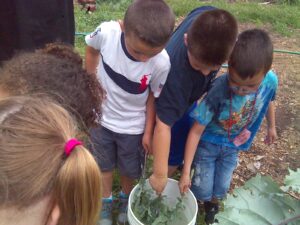
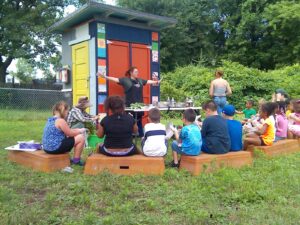
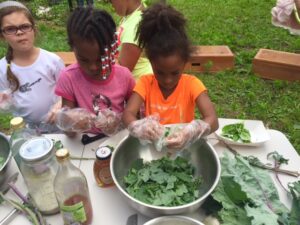
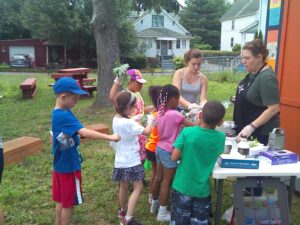
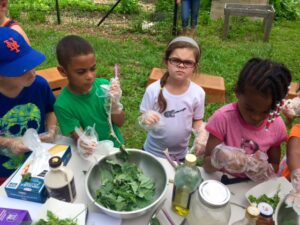
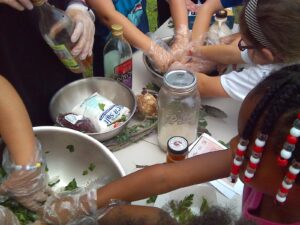
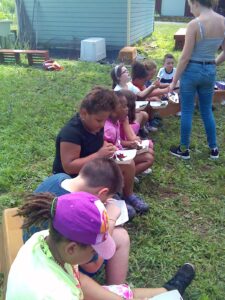
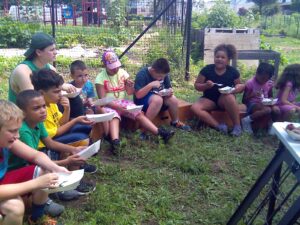
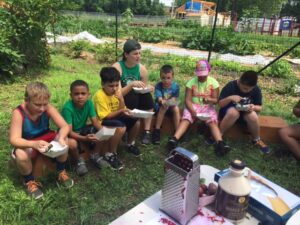
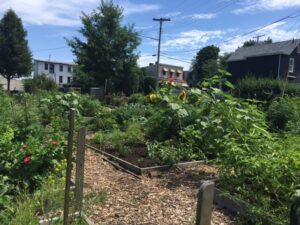
Education & outreach activities and participation summary
Participation summary:
At the conclusion of the season I spoke on a panel, with two other food activists, entitled Selling to Institutions at the Young Farmers Conference hosted by the Stone Barns Center for Food and Agriculture. The panel was well attended and the dialogue was recorded and might be available at a future date through Stone Barns.
Project Outcomes
Potential Contributions
The existing demand for more produce at this particular outlet were greatly inflated, and the location of the Y Market inside the lobby in the back of a building and completely invisible from the sidewalk on a relatively busy main street definitely did not help attract a wider customer base. However, I still feel that the methods outlined above were on-point to form a symbiotic relationship between an urban agricultural project and a more rural small-scale farm.
This grant project really helped me more clearly identify my goals as a grower. I discovered that I'm much more interested in concentrating my farming efforts on education and outreach, and that continuing to endure the loneliness and financial instability of operating a small farm business as a sole-proprietor on an isolated private property is not providing an adequate return on my intellectual and emotional investment.
Future Recommendations
It is well worth replicating an urban agricultural project in conjunction with a YMCA. However, before attempting to build a relationship between such a project and a more rural small-scale farm it is important to evaluate whether the urban population is actually large enough to support and/or necessitate that type of partnership.